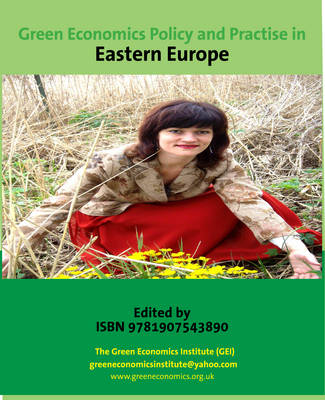The Green Economics Institute has been very active in Eastern Europe asGreen Economics is beginning to be regarded as a very useful tool in helpingto address some of the contemporary problems of the area. It can guide policymaking in terms of self sufficiency and in terms of a slow switch towardssustainability and decarbonisation. It is also informative on human rights,inclusion and access. The Green Economics Institute has been working in orwith partners in Montenegro, Latvia, Estonia, Lithuania, Romania, Moldova,Hungary, Kosovo, Bosnia, Serbia, Slovenia and Albania and many more, withUniversities and policy makers and government officials from across theregion. Many of our team members are from Eastern Europe and so it isextremely relevant to our work. We also have thought for a long time that thisis a critical area in terms of the future of Europe's Economy. Other membersof the team travel there regularly using the train overland from WesternEurope. This is our second book about Eastern Europe and it is largelyinspired by the wonderful team members from Eastern Europe and thetraining courses we have run for government officials we have advised.We3Green Economics: Policy and Practice in Eastern Europealso have been kindly invited to speak on the TV and radio in countries such asEstonia and some of our team members have been Members of theParliaments in the area.
We ran a conference, at Trinity College, University ofOxford last year and this will be our second book resulting from the vibrantdiscussions there. With the new threats from invasion and geo politicalinstability and dependence for energy on larger neighbouring powers, as wellas the tension surrounding the Transatlantic Trade Treaty, there has neverbeen a more pressing need to get a Green Economy up and runningsuccessfully.The Green Economics Institute has succeeded in creating and establishing adiscipline or school of Economics called "Green Economics" and seeks to reformmainstream economics itself into a well-defined goals-based discipline whichprovides practical answers to existing and future problems by incorporating allrelevant aspects, knowledge and complex interactions into a truly holisticunderstanding of the relevant issues.It uses complexity, holism, pluralism andinterdisciplinary working in order to widen the scope of economics, adding thescience from the green aspects, and the social ideas from economics discourses. Thisnew scope for the first time avoids partial explanations or solutions and also biasedand partial perspectives of power elites.The Institute has begun to influence the methodology of mainstream economics,according to Professor Tony Lawson of Cambridge University's EconomicsDepartment (2007).
It uses trans-disciplinary and interdisciplinary methods so thatit can factor in the complexity of nature into economics. It seeks to provide all peopleeverywhere, non human species, the planet and earth systems with a decent level ofwell-being based on practical and theoretical approaches targeting both methodologyand knowledge and based a comprehensive reform of the current economicmainstream. It can, for example, comfortably incorporate glacial issues, climatechange and volcanic, seismic and earth sciences into its explanations and thus in this,and many other ways, it is far more complete and reflects reality much more closelythan its predecessors on which it builds.The current narrow conventional economicapproach using purposely designed methods, is challenged to bring areas andconcepts into its scope which have been until now neglected. Existing outdated orinappropriate propositions and solutions are examined and revised to provide arealistic and more comprehensive understanding of the subject.The Green Economics Institute argues for economic development based on economicaccess and decision making for all, including respect for cultural diversity andnormative freedom.
It does this by bringing together all the interested parties, whowant to help in developing this progressive discipline, by inviting them to its events,and conferences and by means of such activities as writing books and publicationsand using its research, its campaigns and its lobbying and its speeches and lecturingall over the world.4Green Economics: Policy and Practice in Eastern EuropeThe Green Economics Institute created the first green academic journalInternational Journal of Green Economics with publishers Inderscience.The Green Economics Institute has its own delegation to the Kyoto Protocol, and is arecommended UK government reviewer on the Intergovernmental Panel on ClimateChange (IPCC).Members of the Green Economics Institute have lectured or workedin governments and Universities around the world, for example Surrey University,the Schumacher College, The University of Bolzano, the Tyrollean Cabinet, via Skypein Thessaloniki, FYRO Macedonia, Turkey, the National Government School in theUK with top Cabinet Officials, at University in Cambridge and Oxford, TransitionTowns, Oslo, Norway, Liverpool University, Lancaster University, Abuja, Nigeria andGondar, Ethiopia and attended conferences in many places including Cancun, Mexicoand Riga, Latvia and appeared on TV and radio in Italy and Tallin in Estonia and theUK and Bangladesh amongst many others and received invitations the President ofRussia and from the governments and several universities in China and from severalgovernments and Princes in several Gulf States as well as several parts of the UnitedNations and the International Labour Organisation!
Our ideas has been spreading into Eastern Europe and around it and hence TheGreen Economics Institute is pleased that a broader group of readers, students, policymakers, academics and campaigners are now aware of the possibilities of this newdiscipline.Therefore we are pleased to present this new volume which builds on thefirst one and extends the suggestions and goes into more detail about some emergingpractices. We hope you you will enjoy them as much as we have in putting it together
- ISBN10 1907543899
- ISBN13 9781907543890
- Publish Date 1 July 2014
- Publish Status Active
- Publish Country GB
- Imprint The Green Economics Institute
- Format Paperback
- Pages 336
- Language English
